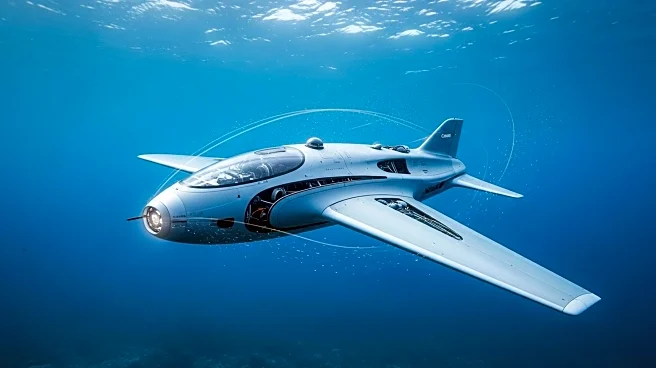What is the story about?
What's Happening?
Teledyne Marine, in collaboration with Rutgers University, has launched an autonomous underwater glider named Sentinel Redwing on a groundbreaking mission to circumnavigate the globe. The mission, which began on October 10, 2025, from the Woods Hole Oceanographic Institution, aims to gather extensive data on ocean currents, sea temperature, and their effects on weather systems. The glider, designed for endurance, will travel approximately 73,000 kilometers, stopping at various global locations including Gran Canaria, Cape Town, Perth, Wellington, and the Falkland Islands. It will transmit data every 8-12 hours via satellite, contributing to NOAA's global monitoring system. The glider is equipped with sensors to measure conductivity, temperature, depth, and track marine life, providing valuable insights into ocean health and weather forecasting.
Why It's Important?
The Sentinel Redwing mission represents a significant advancement in ocean exploration technology, offering the potential to refine weather models and improve hurricane intensity forecasting. By collecting data from under-sampled regions, the mission could enhance understanding of ocean currents and their impact on climate change. This initiative supports global ocean policy and conservation efforts, providing early warnings of extreme weather and contributing to long-term climate models. The collaboration with Rutgers University and international partners highlights the importance of interdisciplinary and cross-border cooperation in addressing global environmental challenges.
What's Next?
As the glider continues its journey, it will provide real-time data accessible to scientists, oceanographers, and meteorologists worldwide. The mission's success could pave the way for a fleet of autonomous underwater gliders continuously sampling oceans, offering insights into ocean dynamics and climate patterns. The data collected will inform future ocean models and contribute to a better understanding of climate change impacts. Teledyne Marine and Rutgers University will continue to monitor the glider's progress, with updates available on Teledyne Marine's website.
Beyond the Headlines
The mission underscores the ethical and environmental responsibility of leveraging technology for sustainable ocean exploration. It highlights the potential for autonomous vehicles to operate with minimal energy consumption, reducing the environmental footprint of scientific research. The initiative also reflects a shift towards more collaborative and inclusive scientific endeavors, involving students and educators in cutting-edge research.
















